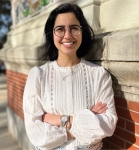|
|

|
| Name |
| Araújo, Ana Rita |
|
| Nationality |
| Portuguese |
| E-Mail |
| anritaraujo@gmail.com |
|
| 1st Degree |
| Biochemistry |
|
| University (1st Degree) |
| University of Porto |
|
| Master Degree |
| Biochemistry |
|
| University (Master Degree) |
| University of Porto |
|
| About the PhD |
| Field of Research |
| Quantitative Cell Biology || Systems Biology |
|
| Thesis Title |
| Temporal Control Principles in Cell Cycle Regulation |
|
| Abstract |
| Cell division is characterized by a sequence of events by which a cell gives rise to two daughter cells. In order to maintain the integrity of the genome, cell growth, chromosome duplication and chromosome segregation must... |
| more |
| Cell division is characterized by a sequence of events by which a cell gives rise to two daughter cells. In order to maintain the integrity of the genome, cell growth, chromosome duplication and chromosome segregation must be coordinated in a manner that ensures the faithful transmission of hereditary information from one generation to the next. Mis- segregation of chromosomes, chromosomal abnormalities and de-regulation of cell division timing are well known hallmarks of cancer. Even though the molecular machinery that drives cell division is the same in all tissues cell cycle duration in mammalian cells varies for different cell types: embryonic cells divide faster than differentiated cells, for example. In addition, classical experiments have highlighted a high level of variability in cell cycle duration even within the same cell type. Understanding temporal control of cell division and, in particular, how the same cell cycle regulators control differences in cell cycle length is a fundamental question in cell and developmental biology. To address this question, a multidisciplinary approach combining live cell imaging of human cells and mathematical modelling was used. It was found that duration of mitosis is strictly dependent on feedback regulation networks that control mitotic entry. Positive feedback within these networks ensures that mitosis is short and temporally insulated from upstream cell cycle events. Modulation of regulatory feedbacks was also found to allow fine-tuning of cell division frequency, showing once more the importance of feedback control in temporal regulation of cell division. The work presented in this thesis suggests that understanding cell cycle dynamics at a single cell level provides a powerful way to derive control principles in cell cycle regulation. Moreover, combining experimental approaches with computational analysis allows a quantitative understanding of temporal control in cell division at a single cell level. This is likely to lead to transformative insights into cell cycle in health and disease states. |
| close |
|
|
| Supervisor(s) |
| Dr. Sílvia Santos |
|
| University |
| Imperial College London |
|
| Laboratory |
| MRC - LMS | Francis Crick Institute |
|
| City |
| London |
|
| Country |
| UK |
|
| Date of Thesis Defence |
| 2018-03-23 |
|
| After the PhD (Current Situation) |
| Position |
| Junior Researcher |
|
| Institution |
| i3S |
| View Institution website |
|
| City |
| Porto |
|
| Country |
| Portugal |
|
|
| Relevant Publications |
|
Positive Feedback Keeps Duration of Mitosis Temporally Insulated from Upstream Cell-Cycle Events
Ana Rita Araujo, Lendert Gelens, Rahuman S.M. Sheriff, Silvia D.M. Santos
Molecular Cell 64, 362–375 October 20, 2016 |
| View Publication |
| Last Update |
| 2022-04-16 21:48:28 |
| The responsibility for this page contents is entirely of the student/alumnus. |
|
 |
|
 |
|
 |
|
 |
|
 |
|
 |
|
Program financially supported by
the National Foundation for
Science and Technology
|
|
 |
|



